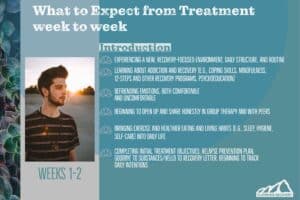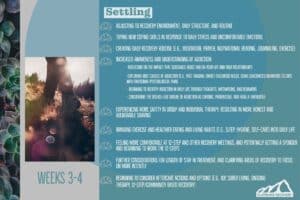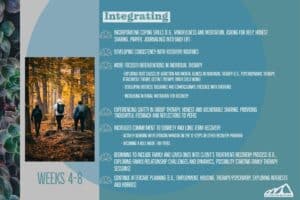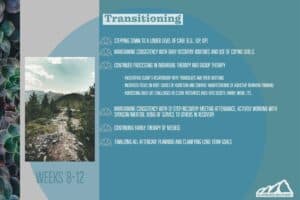What to Expect From Addiction Rehab Week to Week

Being in addiction rehab is a unique experience that generally consists of different phases, not only structurally, as it pertains to different levels of care (e.g., PHP, IOP), but to the emotional, psychological, and spiritual development of the person.
What can one expect out of the addiction rehab experience? For one thing, rehab offers an environment that is supportive of recovery rather than addiction—a place where honest sharing, vulnerability, and feeling our feelings is the norm and encouraged; a place where we can speak about our struggles and feel validated and supported; a place where we can shed light on where addiction shows up in our lives, how it manifests, and most importantly what coping skills we can utilize for mental health and wellbeing.
And yet, treatment is a process, and we don’t often enter feeling ready and willing to expose our hurts and struggle or come to terms with the consequences of our using.
Introduction: Weeks 1-2

It is helpful to view the first two weeks of addiction rehab as an “Introduction” to a new, recovery-oriented
environment. Clients are asked to complete a set of objectives that focus their intentions for recovery (e.g., Goodbye to Substances/Hello to Recovery letter) as well as help them begin to develop a game plan for coping with triggers and cravings (e.g., Relapse Prevention Plan).
Additionally, the first two weeks of treatment are a time when clients feel both the discomfort of being honest and
vulnerable with others, but also its rewards. During this time some people can feel what’s called “the pink cloud”, a powerful sense of relief, elation, optimism, and serenity. While pleasurable and reassuring, “the pink cloud” is often fleeting. It is usually the result of the stark contrast of abstinence and new-found recovery support, versus an indication that “all is well from here on out.” The reality of “life on life’s terms” and its discomfort sets in, and while this may feel discouraging, it is actually an opportunity to dig deeper into recovery.
Settling: Weeks 3-4
 Weeks 3-4 can be called “Settling”, referring to the natural adjustment the client feels being in treatment, participating in groups and individual therapy, and getting more comfortable in their own skin. This is a time when a client’s willingness for long term sobriety increases, when their recovery goals and intentions become more clear, and when they begin to explore, with the support of their therapist, what’s underneath the surface of their addictions.
Weeks 3-4 can be called “Settling”, referring to the natural adjustment the client feels being in treatment, participating in groups and individual therapy, and getting more comfortable in their own skin. This is a time when a client’s willingness for long term sobriety increases, when their recovery goals and intentions become more clear, and when they begin to explore, with the support of their therapist, what’s underneath the surface of their addictions.
The focus of therapy sessions at this phase of addiction rehab may include processing past trauma, grief, loss, and other life challenges that may have provoked addictive behavior, as well as looking at current life challenges and in what ways addiction may be arising there. During this time clients will consider extending treatment at their current level of care (e.g., PHP, IOP), or transitioning to a lower level of care, if clinically appropriate.
Integrating: Weeks 4-8

In weeks 4-8, a stage called “Integrating”, clients are beginning to integrate what they are learning into their daily
lives. With the continued support of treatment, they are incorporating coping skills (e.g., mindfulness and meditation, asking for help, honest sharing, prayer, journaling) into daily life, developing consistency with recovery routines (e.g., recovery meeting attendance, exercise, self-care), going deeper in individual therapy, and experiencing healthy familiarity with the treatment environment and using it as a means to share more honestly and vulnerably.
During this time in their addiction rehab journey, the client is often feeling a greater degree of commitment to long term sobriety, is actively engaged in recovery meetings, and can be a role model for newer clients. Aftercare planning is also refined, including setting up therapy and/or psychiatry for when treatment is completed, researching and applying for new employment if desired, finding new housing or preparing for returning home, and exploring new hobbies and recreational pursuits to integrate into one’s life.
Transitioning: Weeks 8-12
 Weeks 8-12 is called “Transitioning.” This time is both to orient the client’s focus toward “what’s next”, and is also an opportunity to continue to stabilize the foundation of their recovery. Clients continue to practice the coping skills they’ve been learning in response to daily stress or challenges, follow through on recovery intentions and goals, utilize recovery supports (e.g., peers, recovery meetings, 12-step sponsor/recovery coach), and address any blocks, resistance, or reservations they may still have.
Weeks 8-12 is called “Transitioning.” This time is both to orient the client’s focus toward “what’s next”, and is also an opportunity to continue to stabilize the foundation of their recovery. Clients continue to practice the coping skills they’ve been learning in response to daily stress or challenges, follow through on recovery intentions and goals, utilize recovery supports (e.g., peers, recovery meetings, 12-step sponsor/recovery coach), and address any blocks, resistance, or reservations they may still have.
Developing consistency is what this time is for, which is a critical ingredient for long term recovery. It is also a time for continued processing in individual and group therapy. Having peeled back several layers of their addiction, clients begin to really learn about who they are and what their needs are for mental health and wellbeing; they address particular “problem” areas in their life and relationships, which may include family or couples therapy; and develop more expertise in identifying where and how addiction manifests in their life and how to effectively address it.
Beginning the Addiction Rehab Journey
The phases of treatment are an outline for what clients can expect from engaging in this process. Each person will go at his or her own pace, and will have their own set of challenges and victories. Regardless, the experience is unlike anything else, and is often the beginning of a beautiful, new way of life.
By Tobias Gale, MA, LPCC, Lead Therapist at Flatirons Recovery

